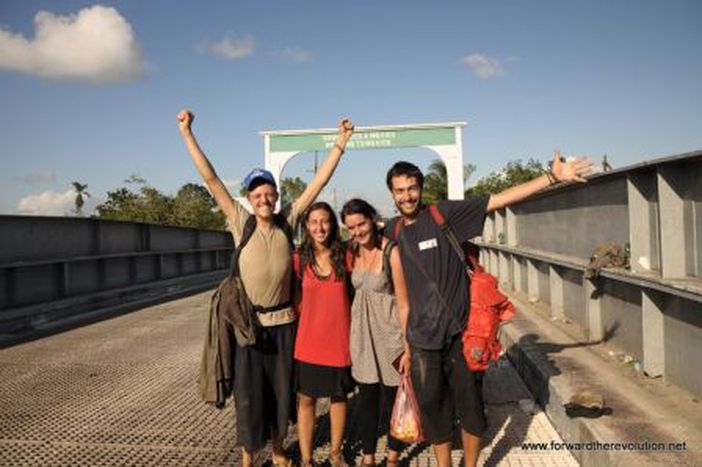
(Choosing to) live without money
Published on
Interview to Belegrinou Sofia
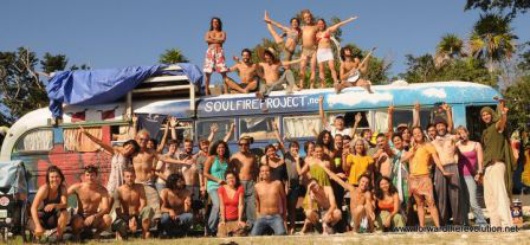 Independence from social norms, brimful love for nature and
environment, peace and harmony; all these wrapped up with religious and
cultural diversity. If living without spending money sounds utopian
nowdays, Under their lifetime motto Forward the Revolution,
Raphael (German), Benjamin (French), my Erasmus fellows can prove you
wrong. From Europe through North Africa to Mexico and Latin America,
they travel without using or accepting money.
Independence from social norms, brimful love for nature and
environment, peace and harmony; all these wrapped up with religious and
cultural diversity. If living without spending money sounds utopian
nowdays, Under their lifetime motto Forward the Revolution,
Raphael (German), Benjamin (French), my Erasmus fellows can prove you
wrong. From Europe through North Africa to Mexico and Latin America,
they travel without using or accepting money.
At the moment, Benjamin is traveling throughout the USA and Raphael is living in Berlin with Nieves and their daughter Alma Lucia. Curently, Lemon Face Films is creating a documentary about Raphael Fellmer and his life without money as well as ’’the search for harmony with mother earth and all beings’’. They try to raise awereness through discussions and presentations in schools, universities and the Media. Raphael and Nieves are looking for a space to create an eco-community in Italy where they want to be self sufficient in all means, ’’open to the world and living in harmony with our beloved planet and all people''.
Ready for a ride?
Forward the (R)evolution. What kind of personal motives/experiences brought you there?
We first met in The Hague during our Erasmus studies and we created together with our dear friend Nicola Zolin, the Locomotive Organisation, a young NGO with the objective to create awareness through creative actions. Everything started with the dream of a better world. This would start by finding harmony with nature, humanity and ourselves. Our initial goal was to reach Mexico through hitchhiking supported only by the good will and faith of locals, in order to demonstrate that humanism is much stronger than money. We believe that coins and bills, possessions and wealth is corrupting hearts, destroying families, friendships, and relations, so we wanted to experience a life without money and find personal harmony through all earthlings and Mother Nature. Our main motivation is to find and learn how we can live in a sustainable and ecological way in harmony with the earth but without feeding back the bank system that creates injustice and inequalities.
How hard it was to begin this initiative and how easy was to leave your lives in Europe and begin a trip to the unknown?
For us it was not hard at all. It was indeed a good lesson about to learn how to be human, how to approach each human being with love, interest and respect. We are life-adventurers by nature and our main principle during the trip was to seek each one’s bright side.
 How realistic do you think it is to live without money, while the percentage of youth unemployment has been reached its peak globally?
How realistic do you think it is to live without money, while the percentage of youth unemployment has been reached its peak globally?
Unemployment creates social injustice. Wars that destroyed our lands for thousands years were triggered for gaining access to resources, petrol, diamonds, gold or fertile lands; hunger is a creation of a minority to sell more and get richer and richer. Social fracture, modern slavery, child labor are the results of the greediness of individuals who are always thirsty for more; pollution and the destruction of the planet derives from the lack of respect by humans towards the earth. Unemployment exists because people need the money to rent a place, eat and pay for bills. For instance, there are so many uninhabited houses and more than enough food to feed everyone, considering that more than 40% of food is thrown away in daily basis in most countries of the developed world (EU, USA, Japan etc). Living completely without any money doesn’t mean one has to go back to the caves. The truth is different; there are plenty of people out there waiting to give something to someone. Streets, electricity, hospitals, schools, internet, everything is related to money, but we can make the difference in our personal life and feed the sick monetary system as less as possible. Less is more by always applying the 4 R: Reject, Reduce, Reuse and Recycle. We are almost 7 billion people on this earth and its time to think globally and act locally. It’s too late to just switch light bulbs, drive a little bit less but continue with our destructive way of planned obsolescence and consumerism. We need to question our system, rethink our habits and find new ways of alternative, sustainable and harmonic forms of living, following the idea that we have to get to the roots of the problems and change the system as a whole. We should all feel part and responsible for what is going on in the world, to stop searching for guilt but to feel the connection between us, the earth and its people. In two words personal responsibility, let us love more instead of hate, let us leave walls and prejudices behind and open our hearts and minds for the world and like Ghandi said: “You have to be the change you want to see in the world”
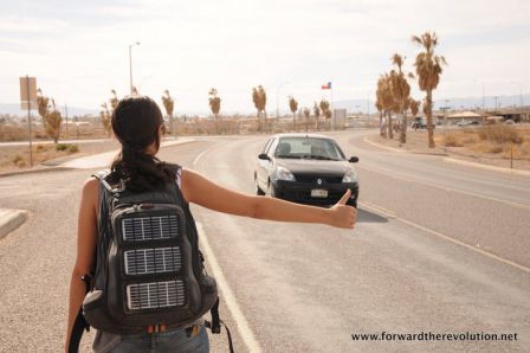 Your philosophy is based on the fact that vegetarianism/veganism would reduce personal carbon footprint. Have you considered this would actually bring the opposite effects; eg, excess of water consummation in cultivations, more use of fertilizers, limitation of nutrition for the animals etc?
Your philosophy is based on the fact that vegetarianism/veganism would reduce personal carbon footprint. Have you considered this would actually bring the opposite effects; eg, excess of water consummation in cultivations, more use of fertilizers, limitation of nutrition for the animals etc?
Based on scientific statistics, we know that the livestock industry is responsible for between 51-80% of global warming, meaning if the entire world would change their diet to a vegan based one, we could easily stop more than half of all green house gases (GHG) emitted by humans every year. This is a doable and practical solution with short-term consequences. In comparison to CO2 GHG who stays for more than 200-300 years in the atmosphere, methane, which comes mainly from cows and other animals, disappears already after 10-15 years! We have to understand that most livestock is fed with corn and cereals, which lose up to 90% of their proteins until we eat them in form of meat. Therefore, if we would not have all the animals who live in often terrible conditions, filled up with antibiotics and other medicines, to survive this torture, we could have up to 9 times more food for humans.
Since we do not need so much food we would need 9 times less fertilizers, chemicals, petrol, machines, electricity, farmers and at the same all humans could eat healthy – and this is not science fiction, this could happened tomorrow! The US alone produces so much grain that could feed more than 1200 million people. Most of the meat we consume in Europe comes from animals that grew in one of the EU-countries and more than 80% of what they eat is imported. Brazil is one of the main producers of soya, which is the main reason for deforestation in the so important Amazon rain forest and more than 70% of all destroyed areas of the jungle are used for the livestock industry.
We believe it is an ethical step to change our diet. Every 4 seconds a human being dies and more than one billion of people are living hungry each day while we throw away half of our food and more than 60% of all grains we harvest in the world is given to animals.
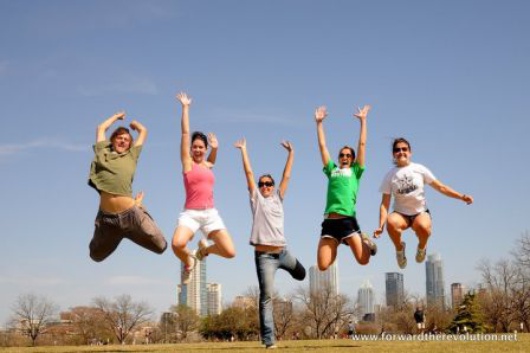 What is your conclusion from your last year's participation in COP16? Tell us a few words about it.
What is your conclusion from your last year's participation in COP16? Tell us a few words about it.
The COP16 has been a very interesting experience. We helped as volunteers in the Klimaforum, one of the alternative forums of the event and we also took part in the manifestations. One of the main teachings of the COP16 is that COP16 was about division, divisions of politicians, of interests, of people. It helped us to realize that it is easy to criticize the politicians when we do nothing from our part. It is time for us to understand that we are the problem and at the same time we are the solution about what is going on around the globe. However, we must admit that it helps to realize we are not ready for a real change.
The hardest part of your entire trip.
First, as all hitchhikers would agree, the hardest thing is time. Traveling without money is all about accepting that we have no control on time and we must trust in destiny. We have been waiting a lot, sometimes until 5 days in a gas station before to finally find someone who could take us. This was hard. But it is was a chance to learn to relax, take advantage of the situation and study, learn languages, meet people, etc.
Second, the hardest thing about this journey or about the life without money might be the uncertainty of everything. When we were traveling, we never knew where we were going to sleep, what we would eat, where we would go. Complete uncertainty is great for those who want to follow their destiny with eyes closed.
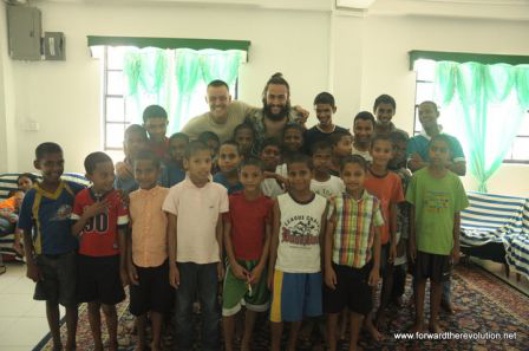 What was your favorite place among those you visited and why?
What was your favorite place among those you visited and why?
There were so many great places and cultures we encountered with, that it would be hard to select the best one. But one country that have left a strong impact in our hearts; Morocco. We got there the first month of our journey, which might also be a reason why the impact was so strong. We got there, fresh, inexperienced, with some fears and doubts, for the first time in a Muslim country.
Morocco was a feast of goodness and generosity. We discovered that according to Quran, Moroccans consider travelers as passengers and they should help providing them food and shelter. We spent five weeks in this wonderful country receiving so much love from the people without even having to ask. People were bringing us breakfast, stopping us at the streets to invite us for a coffee or food and when it comes to hitchhiking, drivers were almost asking us to stay at their place at night. One of the best experience is when we were hitchhiking at night was out of Fez city. Moussa was kindly offered to give us a lift to Casablanca, inviting us in his place. He was very happy to meet some European people. He asked us to stay three days in his flat when the last day his wife gave birth to Yarya, a beautiful baby we were allowed to hold in our arms. So much trust, love and generosity that helped us during this whole journey and will be engraved in our hearts forever.
What are your plans now that you come back to Europe? How do you plan to transmit this experience and knowledge onto European youth?
The idea is to live in Europe for free in a house with an older person and in exchange we clean, cook, do the gardening etc. Later on, we will create a recycling network, in order to find places where food is thrown away and find ways to use all of the precious food mother earth gave us. Another useful network of people will be a kind of free economy, where everyone can exchange and share their knowledge, gifts and talents with other; a place to learn and teach for free a platform of giving and receiving e.g.: yoga, languages, freeganism, cooking, art, music, permaculture, meditation, ecology and much more. We are also planning to establish Free Shops where everyone can bring what he/she does not use anymore and take what he/here needs. We want to share our marvelous experience and everything we learned on this journey with people, students, universities and the media, to build up awareness for the environment and what each individual can actually do in order to find harmony with the planet and their fellows. During these 13 months we also wrote a lot about the adventures of the trip and the reality seen with our own eyes, that we wish to share everything for free in a digitally formed book and perhaps publish it with a sustainable way of printing.
--
For more information about their philosophy, pictures of their trips and more adventure stories hit forwardtherevolution.net



